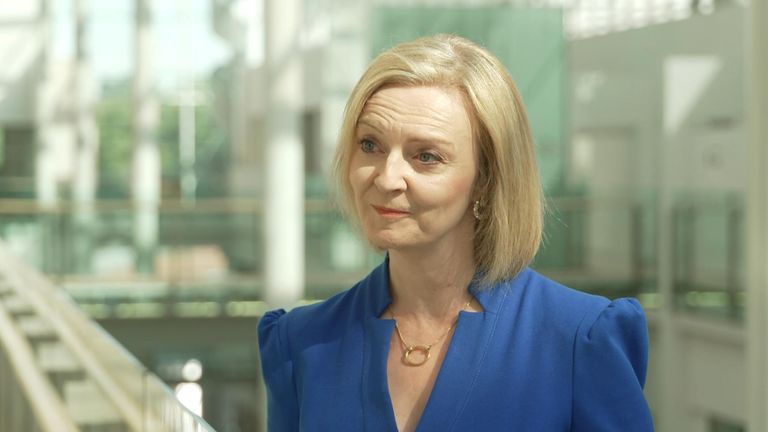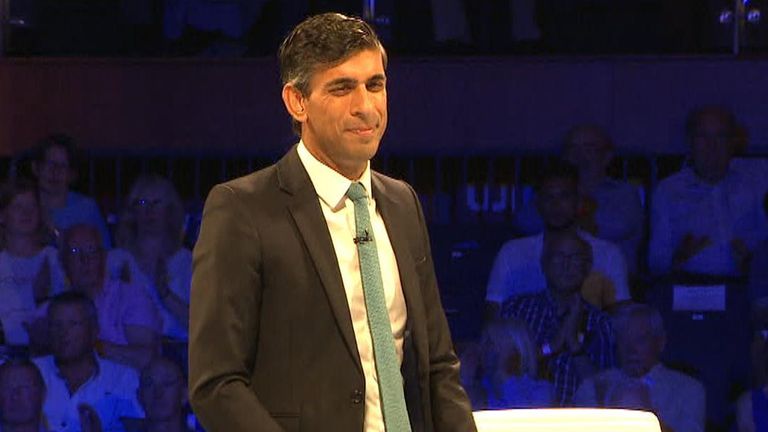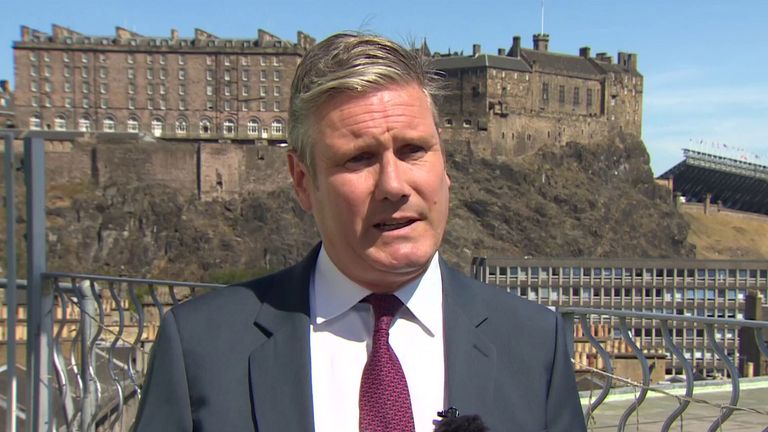Pressure is mounting on the government to put forward detailed proposals to curb rocketing gas and electricity prices after energy regulator Ofgem announced the price cap for an average household will rise to £3,549 a year in October.
The figure is £800 more than the forecast figure that was provided to Rishi Sunak in May when he was chancellor.
The price cap sets a limit on the amount suppliers can charge for each unit of gas and electricity used. It also sets a maximum daily standing charge (what you pay for your home to be connected to the grid).
As calls for the government to act grow, Chancellor Nadhim Zahawi said on Friday morning that he is “working flat out” to develop more options to support people – but insisted it would be for the next prime minister to decide what support to deliver.
Boris Johnson has also stressed he will leave decisions on further support to his Downing Street successor – either Liz Truss or Mr Sunak – who will not take up the position until 5 September.
But what are the two leadership contenders’ plans to ease the burden of soaring energy bills? And what other proposals have opposition parties and some of the UK’s biggest power companies put forward?
Tory leadership contenders
Liz Truss
At the latest Conservative Party hustings on Thursday evening, Tory leadership frontrunner Liz Truss changed tack and announced that she would use an emergency budget to “ensure support is on its way” amid soaring energy bills if she becomes prime minister – despite repeatedly saying she favours tax cuts over handouts.
Ms Truss had previously said her priority was to cut taxes to help people cope with the sharp rise in energy prices, rather than give further “handouts”.
Analysis from the Resolution Foundation suggests that Ms Truss’s proposal to cut environmental levies and pause national insurance would benefit the richest households 10 times more than the poorest.
The foreign secretary has also pledged to temporarily halt the green levies that households pay to ensure renewable energy generation is funded.
Yet cutting the payments could derail the UK’s path to net zero and leave the government open to legal action while only seeing limited benefit, critics have said.
Slashing the two main green parts of the energy bill – the renewables obligation and the green gas levy – would only save around £80, according to energy consultancy Auxilione.
Rishi Sunak
Ms Truss’s rival, Rishi Sunak, has said if he becomes prime minister he will extend the scheme he launched in May that provided every household with £400 off this winter’s fuel costs, rising to £1,200 for pensioners and those on benefits.
The former chancellor said his plan would slash rising energy bills for up to 16 million vulnerable people and, in a swipe at his opponent, dismissed “the boosterish talk of others”, adding that “you can’t heat your home with hope”.
He has also proposed to cut VAT on household energy bills, though this would only provide limited relief to households, especially those most in need of help, while also generating less cash for the stretched public finances.
Mr Sunak has said he would offer specific support to pensioners and those on benefits as they “simply cannot increase their incomes to meet their energy costs and are the most vulnerable in society”.
He said universal credit, winter fuel payments and similar routes would be used to top up their incomes, with the goal of ensuring they were no worse off as a result of rising bills.
Labour
Looking to fill the vacuum in Number 10, opposition leader Sir Keir Starmer has set out a £29bn emergency plan to stop energy bills rising over the winter, which would be funded in part by an extension of the windfall tax on the bumper profits of oil and gas companies.
He said his proposal – which would freeze energy prices at the current price cap rate for six months – would save the typical family £1,000 immediately, get energy costs under control for the future and help tackle inflation.
To pay for the measures, Labour said it would close a “loophole” in the levy on the profits of the energy companies announced by Mr Sunak in May and backdate the start to January.
The price freeze would also mean Labour would not go ahead with the £400 rebate on energy bills that the government had promised all households in October to dampen the impact of rising prices.
The Institute for Fiscal Studies has questioned Labour’s proposed funding for the support package, arguing some of its calculations are an “illusion”.
Analysis carried out by the Resolution Foundation suggests that Labour’s approach would by far have the biggest impact among all social groups – but is less targeted than Mr Sunak’s and much more costly.
Liberal Democrats
The Liberal Democrats have pressed the government to cancel the rise in the energy price cap as part of what it called an “energy furlough scheme”.
The policy in part would be funded by levying an even bigger windfall tax on oil and gas companies.
The Lib Dems have suggested increasing the rate from 25% to 30%, expanding it to cover profits dating from last October, and for it to cover a bigger share of what companies make globally.
The party has also called for a “double freeze” on cost of living issues – stopping the inflation-based increase in rail fares that is due to come into force in January alongside cancelling the rise in the energy price cap.
Green Party
The Green Party has called for the energy price cap to be returned to what it was in October 2021.
It says the government should “absorb the global price rises through taxing the huge profits of the oil and gas companies”.
The party has also called for the big five energy retailers to be brought into public ownership to stabilise the market and lay the groundwork for the huge investment they say is needed in renewables and insulating peoples’ homes.
It has called for the government to make home insulation a priority by creating a “nationwide home insulation scheme” which would reduce energy bills.
More support for small businesses is also needed, the party has said.
Energy companies
Major energy suppliers Scottish Power and Eon have proposed the setting-up of a special “deficit” fund that would allow the industry to freeze customers’ bills for two years.
Using commercial loans, backed by a government guarantee, utility firms would cap the bills of customers on default tariffs and fund the shortfall with the wholesale price by drawing down from the central pot.
The loans would be repaid in the longer term by suppliers adding a small levy to customers’ bills or through taxation.
It is estimated it would need about £50bn from the banks to cover all 22 million households on default tariffs.
Subscribe to the Daily podcast on Apple Podcasts, Google Podcasts, Spotify, Spreaker
Other countries
The UK is not the only nation struggling to deal with the financial fallout of rising energy costs, fanned by supply fears after Russia’s invasion of Ukraine.
At the start of the year, the French government forced the state-owned energy provider, Électricité de France, to cap electricity tariff rises at 4%.
In addition to one-off payments to poorer households, it has also reduced taxes on electricity.
Spain has cut VAT on energy bills from 21% to 10%, funded through a windfall tax on energy companies.
A fuel subsidy plan in Italy aims to enable families to keep their fuel bills at around 2021 levels.
Alongside a package of financial support measures in Germany, where households pay more for electricity than any other country in the EU, the government has also taken a series of steps to reduce energy demand, including dimming street lights, turning off fountains and lowering the temperature in public swimming pools.










